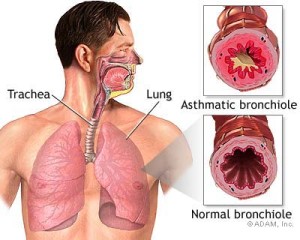Have you ever ran, worked out or played a sport outdoors in cold temperatures? If you answered yes, then you most likely have experienced the painful, dreadful sensation of feeling as though your throat and lungs are on fire in addition to feeling a tightening sensation in your chest. But why? What is it about the temperature of the air that causes such an uncomfortable feeling?
The sensation is caused by a complicated process that occurs within our bodies every time we take a breath of cold air. As you take in a breath of cold air your body immediately begins working to warm the air to body temperature. The process begins as the nasal cavity and windpipe work together to warm the cold air. Because cold air is, general speaking, very dry, cells in the nasal cavity and windpipe infuse the cold air with humidity in order to add moisture to the dry air. The humidity helps warm the temperature of the air while reducing the dryness. Dehydration and irritation occur when the cells give up their humidity to the cold air. The dehydration and irritation cause a burning sensation within the windpipe, which is the feeling we experience when we take in a breathe of cold air. (Wonderopolis)
While you are working out, you are taking more and deeper breathes in order to fuel your body versus if you were only standing outside or walking at a comfortable, slow pace. This is why we only experience the burning and tightness in our chests when we are participating in challenging physical activity. Furthermore, going on a run or engaging in a sport outdoors requires participants to take short and sharp breathes as well as deep breaths. These short and sharp breaths cause irritation in the lungs and chest as it challenges the body to keep up with warming process, which can be difficult to do. As your body struggles to keep up with warming the new air, your lungs become irritated causing your chest to feel a tightening sensation.
According to a study done by scientists E.C Deal Jr, E.R McFadden, R. H Ingram, R. H Strauss and J. J Jaeger, the respiratory heat exchange of changing cold air to body temperature can also cause exercise-induced asthma, furthering the feeling of a tight chest and burning throat. The experiment had those involved in the study breathe in dry air in between the temperatures of zero to 80 degrees Celsius. The scientists then changed the temperature from the before indicated temperatures to temperatures ranging from -11 to 37 degrees Celsius and observed the changes. The study showed that the more moisture there was in the air depending on temperature, the less bronchospasms those involved in the study experienced. The results thus showed that the drier the air, the harder and more painful breathing is for those working out in cold air. However, it is possible that the study could be due to chance or a fluke. As a result, the hypothesis that the temperature and dryness of the air can cause exercise-induced asthma in the cold, is either correct or a false positive.
However, if you enjoy running and working out outdoors all year round, do not panic! There are scientifically proven ways to help prevent and reduce the burning and tightening sensations. The number one prevention method is to use a scarf or piece of clothing to cover your mouth in order to trap in warm air. Furthermore, its important to hydrate before running because the more moisture in your body, the more moisture available to help warm and hydrate the cold, dry air. Both methods are simple ways that allow you to continue your outdoor workouts in a healthy, comfortable way!



I was excited to come across this topic as I was scrolling through all the blog posts. Just the other day I was going on a run when I experienced the familiar feeling of burning lungs. It was the first time I ran while it was cold out so I figured the cold had some underlying connection with the burning throat and lungs I was experiencing afterward. I thought it was innovative of you to specify ways to avoid the burning throat and lungs feeling one can obtain while running in the cold if you like to run outside in all temperatures.
I think this topic is interesting because in high school, I ran indoor track. Although the meets were inside, the practices were inside unless it was too cold to go out. I live in West Chester, PA, so the temperatures in the winter are relatively close to what they are in State College. Whenever we went outside, the practices and the running was much harder because of breathing in the cold air. the finds in the studies you included in your blog are similar to the experiences I had while running in cold weather. (burning throat and tight chest)
Hey Haley! I’ve experienced this exact feeling in the past week. After I got back from a morning bike ride my chest was feeling especially weird! I think you did a great job exploring this phenomenon.
I’ve actually experienced almost the same feeling after spending a lot of time swimming in the pool. Something you could do to take this post further would be if there are similarities between lung pain after swimming and the pain felt running in cold temperatures!
Also, I think it would benefit you post to explore if the effects of running in cold air can permanently damage the lungs. I found an interesting article on runnersworld’s website that asks that question!
http://www.runnersworld.com/running-tips/is-cold-weather-running-bad-for-you